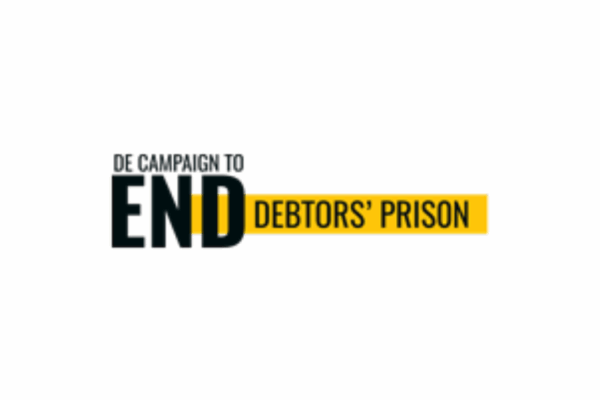FOR IMMEDIATE RELEASE: May 21, 2020
CONTACT: Meryem Dede, (513) 378-9191, [email protected]
Delaware Court System Ranked Near-Last in National Fines and Fees Index
News Provided by the Delaware Campaign to End Debtors’ Prisons
WILMINGTON — The National Center for Access to Justice (NCAJ) at Fordham Law School has launched a first-of-its-kind Fines and Fees Index, providing a comprehensive set of standards for ensuring fines and fees are applied in a way that is fair and equitable. Ranking 50 U.S. States and Washington D.C. against 17 policies, NCAJ’s Fines and Fees Index placed Delaware 47/51, receiving a score of 8/100. Delaware ranked ahead of only Wyoming, Alabama, Arkansas and Kansas.
Explore the Fines and Fees Index
NCAJ notes that “Delaware, the home state of U.S. President Joseph Biden, earned a ‘yes’ score on just two of the 17 best practices.” President Biden’s campaign platform specifically addressed fines and fees as a serious issue needing attention. While most fines and fees reform needs to happen at the local level, not federal level, such national advocacy lends hope.
Delaware’s performance relative to the 17 benchmark policies is not surprising to local organizers. Started as a grassroots campaign in collaboration with Network Delaware and the Metropolitan Wilmington Urban League, the Campaign to End Debtor’s Prisons (CEDP) advocates for fines and fees reform within the state of Delaware. Among other proposals, CEDP calls for an end to driver’s license suspensions for unpaid court debt and advocates for reforms so courts can waive fines and fees for defendants unable to afford them.
Even before the publishing of the Fines and Fees Index, the need for reforms had already gained the attention of key decision makers in Delaware. At the beginning of 2021, Delaware Attorney General Kathleen Jennings announced ending excessive fines and fees as one of her top ten legislative priorities for the current session. “This is a modern day debtor’s prison. If we want to reduce recidivism, we have to end the senseless, vicious cycle of court fines and fees that rack up on people who are clearly unable to pay,” said Jennings in a video announcement in February.
Other Delaware leaders have also been vocal. “It is counterproductive to take away the legal ability to drive for reasons unrelated to driving. This sets individuals up to either lose their employment or risk being arrested for driving without a license, with either setting up individuals for continued debt and poverty,” said former Delaware Chief Judge of Family Court Chandlee Johnson Kuhn. “I have seen first hand the impact this has on children and families. And because license revocation is often legislatively mandated, Delaware judges do not have the discretion. Judges are well aware that license revocation increases the chance of condemning individuals to a lifetime of debt, poverty, and reliance on social services, but judges are required to follow the law as written.”
Delaware U.S. Senator Chris Coons has also been advocating for fines and fees reform at the national level. In March, Senator Coons and Senator Roger Wicker (R-Miss.) reintroduced the Driving for Opportunity Act, which incentivizes states to stop debt-based driver’s license suspensions. It is estimated that nationwide at least 11 million people have their driver’s licenses suspended because they cannot pay fines and fees, not for any public safety reason. In Delaware, just in 2017, 20,679 driver’s licenses were suspended for failure to pay court-ordered fines and fees.
Local organizations supporting reform of Delaware’s fines and fees system include the Coalition for Smart Justice, ACLU of Delaware, Delaware Center for Justice, Delaware Poor People’s Campaign, Delaware United, League of Women Voters, Delaware Racial Justice Collaborative, Indivisible Highlands and Beyond, Wilmington Community Advisory Council, Coalition to Dismantle the New Jim Crow, Unitarian Universalist Delaware Advocacy Network, and The Wilmington HOPE Commission.
Ranking near-last in the Fines and Fees Index highlights the urgency of legislative reforms in Delaware. “It’s time to prioritize the reduction of the too easily ignored collateral damage that our system of fines and fees has on marginalized and low-income people” said Meryem Dede, co-coordinator of CEDP. “Bold legislation should be introduced now and passed before June 30.”
About the Campaign to End Debtors’ Prisons
The Campaign to End Debtors’ Prisons is a coalition of community members through Network Delaware and the Metropolitan Wilmington Urban League Building People Power Campaign pushing for reform of Delaware’s state court fines and fees system. Currently, Delaware Courts impose fines and fees without consideration of someone’s ability to pay. This unfairly punishes people who cannot pay hundreds of dollars in court debt. When people cannot pay their court costs, they face harsh punishments: suspended driver’s licenses, arrest warrants, and even incarceration.


